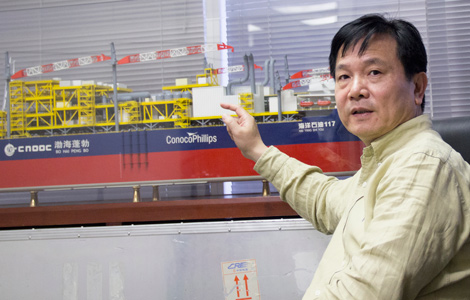China, Brazil ties are good for region's other nations
Updated: 2014-05-05 05:07
By Zhang Fan in New York (China Daily Latin America)
|
|||||||||
A way to increase both countries' influence on the global stage
A strong tie between China and Brazil is an important part of South-South cooperation and can better protect the interests of developing countries, experts said.
 |
|
A paddleboard surfer floats past a Navy patrol ship off Barra da Tijuca beach in front of Hotel Windsor, where the auction for Libra offshore oilfield took place, in Rio de Janeiro in this file photo taken in October 2013. [Photo/Agencies] |
"The cooperation between China and Brazil can strengthen the South-South cooperation and advance the liberalization of modern international relations, making the world more balanced and peaceful," said Chinese Foreign Minister Wang Yi at the first meeting with his Brazilian counterpart, Luiz Aberto Figueiredo Machado in Brazil recently.
Wang called on China and Brazil to "consolidate and deepen" their strategic mutual-trust and launch strategic cooperation at all levels.
Machado echoed his comments, and said that strengthening strategic cooperation with China has been a key point of Brazil's foreign policy, and that Brazil sees China's continuous development as an important opportunity for Brazil.
"Their words show that the relationship between China and Brazil has entered a new level and it is time to discuss new mechanisms for further cooperation and innovation," said Zhou Xinyu, researcher on International Relations at Beijing Foreign Studies University. "Both countries realize that it is time to deepen the ties. Two of the most remote countries are getting closer because of sharing interests."
By the end of 2013, trade between China and Brazil was more than $90 billion, an increase of 5.3 percent from 2012.
China has been Brazil's largest trade partner, largest exporting market and largest importing market for five years. The two countries launched several projects in various sectors, including natural resources, agriculture, and infrastructure.
Sun Hongbo, a Latin America expert at the Chinese Academy of Social Sciences, said the two countries have laid great foundations through economic cooperation, and it is time for them to "express more political willingness" to deepen understanding and enlarge the influence of such cooperation to all of Latin America and other developing countries.
"They should always remember that the China-Brazil tie is a part of South-South cooperation. A more mature China-Brazil tie can increase the influence of the two countries in the region and in the world, also it can enhance the influence of some middle- and small-sized countries in the region," Sun said.
According to China's National Development and Reform Commission, Chinese companies increased their investments in Latin America to $83.4 billion in 2013 from about $68.2 billion in 2012. Infrastructure and manufacturing received increased investments, creating more job opportunities for local workers.
"A steady partnership with Latin American countries needs their understanding and support toward China, especially from large countries like Brazil and Argentina," said Sun, "Practical cooperation such as in technologies and infrastructure can show that China does not simply target their natural resources, but is looking for sustainable cooperation."
Ann Lee, an economist at New York University, said big regional countries such as Brazil have been trying to develop their countries by learning from China.
"I met Brazil's vice-president and a lot of congressmen from the country. They are all talking to me about what Brazil can learn from China's innovation, because they want to do the exact things. However, I think it might be tougher for Brazil because the two countries have different cultures and social systems," Lee said.
She said China has expressed willingness for Brazil to become a stronger economic partner. "Brazil knows they can not just rely on being a resource country. I think they will further develop through the cooperation with China, but they need to first solve some serious issues such as with labors," Lee said.

 World leaders when they were younger
World leaders when they were younger
 H&M promotes summer collections with DJ show
H&M promotes summer collections with DJ show
 Getting a taste for the World Cup
Getting a taste for the World Cup
 Sino-US doctors join hands to fix young hearts
Sino-US doctors join hands to fix young hearts
 CSSC to expand its offshore businesses
CSSC to expand its offshore businesses
 Lenovo CEO honored with Edison innovation award
Lenovo CEO honored with Edison innovation award
 Shopping spree
Shopping spree
 Top 10 world's highest-paid athletes
Top 10 world's highest-paid athletes
Most Viewed
Editor's Picks

|

|

|

|

|

|
Today's Top News
Chinese premier arrives for Ethiopia visit
CPC members earn more than non-members:survey
Malaysia sees drop in Chinese tourists during May Day break
Shanghai building collapse kills 2
Clashes at Ukraine's Odessa kill dozens
Hillary urged to seek presidency
Premier Li leaves for Africa tour
Drop in Chinese tourists to Malaysia
US Weekly

|

|






